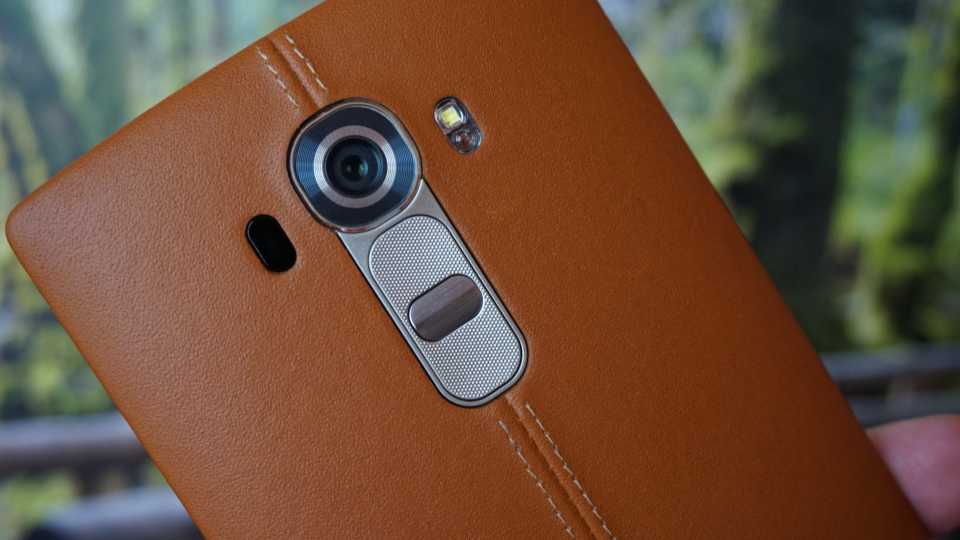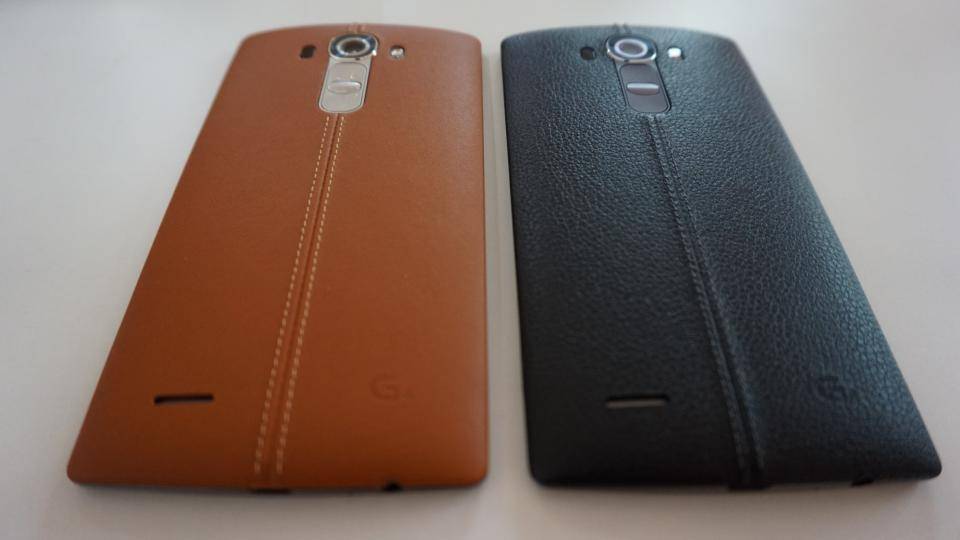Released in April 2015, the LG G4 used to be a flagship phone and was among the only phones in the market that had an all-leather design. That clearly didn't work out for LG, as it has since been discontinued and replaced by the LG G6 (and the LG G7, too). You'll now struggle to find the G4 brand new, so we'd suggest avoiding buying a second-hand example and getting yourself the newer, greatly improved LG G6 , instead.

If you're keen to know more about the older LG G4, continue reading our review, below.

READ NEXT: LG G6 review: Last year's flagship phone has significantly dropped in price
LG G4 review: Design
The leather is certainly an intriguing choice of design, but I was pleasantly surprised by just how comfortable it felt. The stitching down the centre is a particularly classy touch, and the smooth tan leather option provided just as much grip as the stippled black version.

^ The tan leather has a much smoother texture compared to the grainier black model
Measuring 149x75x8.9mm thick, it's not the slimmest of phones, but LG said that its customers were more than willing to sacrifice a few extra millimetres for a more ergonomic design – and I'd be inclined to agree. However, the leather cladding does add a considerable premium onto the handset. If leather isn't quite your bag, it's also available in cheaper 'ceramic and metallic' versions (both of which are really plastic).
They're still decent alternatives, as the ceramic model I had in for testing has a very subtle diamond-shaped pattern on the back of the handset. This adds a bit of visual flair to the phone when it catches the light, but in the hand it feels almost exactly the same as the plastic LG G3 , making it a bit dull and tacky compared to the attention-grabbing leather versions. Having tested both models, I personally prefer the G4's curved leather rear.
The curve extends to the front of the screen as well, but the arc is so infinitesimally small that you'll barely even notice it unless you put the phone face down on the table. It's certainly nowhere near as curvy as the LG G Flex 2 , but at least it should still help protect the screen if it happens to fall face down on the floor.
LG G4 review: Display
The 5.5in 2,560x1,440 display was one of the stand-out features on the LG G3, so it's no surprise that LG has reprised this resolution for the G4. The resolution isn't quite as special as it once was, though, as both the Galaxy S6 and S6 Edge now have 2,560x1,440 resolution displays as well. What's more, they both have higher pixel densities of 576 pixels-per-inch (PPI) thanks to their smaller 5.1in screens, beating the G4's pixel density of 534PPI by quite some margin.
LG may not have the sharpest screen in the business any more, but its secret weapon is undoubtedly its brand new IPS Quantum panel. Not to be confused with LG's Quantum Dot technology used inside its TVs, the G4's screen uses a new type of liquid crystal that's meant to enhance brightness and overall colour accuracy.
^ On first glance, you could almost mistake the G4's IPS Quantum display for an OLED panel
In practice, the screen really does pop out at you when you first turn it on, showing lovely rich, vibrant colours and eye-searingly bright whites. Subjectively, it's almost comparable to the OLED display I saw on the G Flex 2 in terms of sheer colour intensity, but the G4 higher brightness level of 505.66cd/m2 really helps to keep those colours looking just as punchy both inside and out, particularly if you're out in the sun.
Blacks were deep at 0.27cd/m2 and we were suitably impressed with the G4's contrast levels, which LG says are supposedly 50% higher than those on the G3. This would certainly seem to be the case according to my own tests, as I measured a huge contrast ratio of 1,715:1, which beats the G3's measly 741:1 by quite some margin. Again, when I compared the G4 side by side with the G Flex 2, I could barely tell the difference in terms of image detail, which is good news for anyone still debating whether to go for this or a Galaxy S6, and the G4's viewing angles were just as wide as its curvier brother.
However, LG's boldest claim about the G4's display relates to its colour reproduction, and sadly that's not one I could back up during my calibration tests. According to LG, it's the only smartphone display that can reach 98% of the Digital Cinema Initiative (DCI) colour gamut, which covers a much wider range of colours than the traditional sRGB gamut, particularly when it comes to the number of shades of red.
^ According to our results, the G4 covered 96.3% of the sRGB colour gamut, with its weakest areas being its red and yellow coverage
LG says this equates to about 120% of the sRGB gamut, but our colour calibrator showed the G4 was only displaying 96.3% of the sRGB colour gamut. What's more, it was the G4's reds and yellows that fell short of the gamut boundary. Of course, 96.3% is still a highly respectable score for an IPS display, and it's easily one of the most subjectively pleasing screens I've seen outside of Samsung's Super AMOLED screens on the Galaxy S6 and S6 Edge, even if the nitty-gritty numbers (in my tests) don't quite live up to LG's promises.











